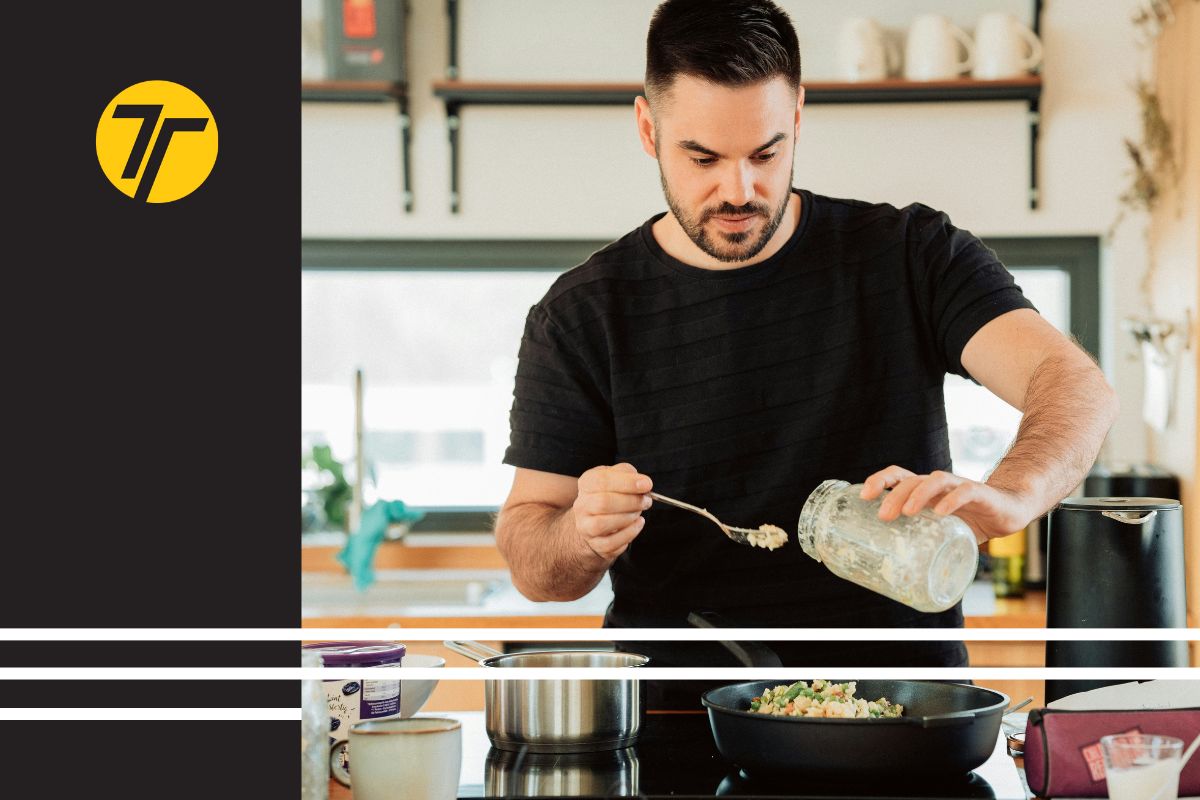
As a nutrition coach, one of the biggest challenges you may face is keeping your clients motivated to stick with their nutrition plans. It’s easy for people to start off strong, but as the weeks go by, old habits can start to creep back in and derail progress.
Your role goes beyond just telling clients what to eat. You’re also a source of guidance, support, and motivation. By using proven nutrition coaching tips and strategies, you can help clients stay excited about their healthy eating journey—even when the going gets tough.
👉 Free Resource: The Foolproof Guide to Adding Nutrition Coaching to Your Services
Read on for 10 powerful yet practical nutrition coaching tips that can make all the difference in keeping your clients motivated and on track!
10 Nutrition Coaching Tips to Keep Clients Motivated
Here are 6 powerful nutrition coaching tips to keep your clients inspired and engaged:
#1: Focus on foods that energize
When people eat heavily processed foods high in sugar and unhealthy fats, it often leaves them feeling sluggish and fatigued. But when they fuel up with nutrient-dense, energizing foods, they tend to feel more vibrant, focused, and driven to stay active.
Encourage your clients to build their meals and snacks around fresh fruits and vegetables, lean proteins, healthy fats, and complex carbs.
- For example, a breakfast of eggs with spinach and avocado will provide steady energy compared to a sugary pastry that spikes blood sugar then leads to an energy crash. Snacks like apples with almond butter, carrots and hummus, or a smoothie packed in vitamins and minerals will keep bellies full while stabilizing energy levels!
Even small changes, like swapping white bread for whole grain or soda for green tea, can make a big difference in how your clients feel.
When your clients experience the energizing effects of a wholesome diet firsthand, they’ll be much more inspired to stick with their nutrition plan.
👉 Check Out: How to Add Nutrition Coaching to Your Fitness Studio
#2: Stress the importance of meal tracking
Another key tip is to emphasize the power of meal tracking. As the saying goes, “what gets measured, gets managed.” When your clients regularly log their food intake, it creates a sense of accountability and awareness that can be incredibly motivating.
With meal tracking, your clients gain valuable insights into their eating patterns, portions, and progress over time. They can see how well they’re sticking to their plan and identify areas for improvement. This empowers them to take ownership of their choices and make adjustments as needed.
As a nutrition coach, you can make meal tracking easier and more engaging for clients by using an app like ABC Trainerize. Its user-friendly meal tracking feature allows clients to easily log meals and snacks right from their smartphone. They can scan barcodes, save favorite meals, view their macros, and even snap photos!
Plus, you’ll be able to see clients’ food logs and offer timely feedback, support, and nutrition coaching to keep them on track. Because tech + your expertise = a powerful accountability system that helps your clients reach their goals.
#3: Promote meal prep
Meal prepping is a game-changer when it comes to sticking with a nutrition plan. When clients set aside time to prep healthy meals and snacks in advance, they set themselves up for success all week long (not just Monday and Tuesday).
Guide your clients in creating a meal prep routine that works for their lifestyle and goals. Educate them on planning, shopping, and cooking techniques to streamline the process. You can even share your favorite make-ahead recipes to keep things fresh.
Quickly create personalized, well-balanced meal plans for your clients with our new Smart Meal Planner. The Planner comes loaded with a deep recipe bank, so you can offer your clients a diverse selection of nutritionally balanced options to choose from.
Plus, you can identify and select recipes that any client can make quickly—with minimal ingredients, too. Some of the very best recipes are ones that can be cooked in batches to support a simple weekly meal plan!
👉 Check Out: Create a Meal Plan Using the Smart Meal Planner
#4: Frame weaknesses as areas for improvement
The language you use as a nutrition coach can have a huge impact on your clients’ motivation and mindset. When discussing areas where clients struggle, it’s important to frame them as opportunities for growth rather than failures or weaknesses.
For example, instead of saying “It looks like you really struggled with late-night snacking this week,” try reframing it as “Let’s identify some strategies for managing late-night cravings, what do you think?” This approach acknowledges the challenge while focusing on the potential for positive change.
By framing setbacks as learning experiences and chances to develop new skills, you empower your clients to view their journey through a more optimistic lens. They’ll feel less discouraged by missteps and more motivated to keep working towards their goals.
When it comes to providing feedback, always emphasize progress over perfection. Celebrate clients’ wins, no matter how small, and consistently remind them of how far they’ve come.
#5: Practice active listening
Active listening is a powerful tool in your nutrition coaching toolbox. It goes beyond simply hearing what clients say to truly seeking to understand their experiences, challenges, and goals. When clients feel heard and understood, it builds trust and rapport, making them more receptive to your guidance.
In practice, active listening involves giving clients your full attention, asking open-ended questions, and reflecting back what you hear. For example, if a client expresses frustration with their progress, you might say, “It sounds like you’re feeling discouraged because the scale hasn’t moved as quickly as you hoped, despite making consistent healthy choices.”
This shows the client that you’re listening closely and validates their feelings. From there, you can explore solutions together, such as focusing on non-scale victories or adjusting their expectations.
Active listening also helps you uncover underlying issues that may be impacting your clients’ motivation, such as stress, emotional eating, or lack of support. By creating a safe, non-judgmental space for clients to share, you can better tailor your nutrition coaching to their unique needs.
Remember, clients are more likely to stay motivated when they feel understood, supported, and valued. Active listening is key to building that connection.
👉 Check Out: The 5 Key Elements of Good Nutrition Coaching
#6: Motivate through empathy
When clients feel that you genuinely understand and care about their struggles, they’ll be more open to your support and guidance.
Empathy involves putting yourself in your clients’ shoes and acknowledging their emotions without judgment.
- For example, if a client shares that they’ve been stress eating due to a heavy workload, respond with compassion. You might say, “I can imagine how overwhelming that must feel. It’s understandable to turn to food for comfort when you’re under that kind of pressure.”
By validating their experience, you show clients that they’re not alone and that their feelings are normal. This can be incredibly motivating because it helps them feel seen and supported, rather than judged or criticized.
From there, you can work together to brainstorm healthy coping strategies that align with their goals. Maybe it’s practicing mindful eating, developing stress management techniques, or finding a low-calorie comfort food alternative. The key is to lead with empathy and meet clients where they’re at.
👉 Check Out: Optimal Nutrition Basics: Protein 101
#7: Encourage mindful eating practices
When clients say things like “I’m always hungry,” “I eat when I’m stressed,” or “I didn’t even realize I ate that,” it’s often a sign that they’re disconnected from their eating habits. That’s where mindful eating comes in.
Mindful eating involves slowing down and paying attention to food, not just what’s on the plate or food choices, but how it makes your clients feel.
- For example, if a client struggles with portion control, encourage them to pause halfway through meals and check in with their hunger. Ask: “Are you still hungry, or are you just finishing the plate out of habit?”
This approach is especially helpful for clients whose primary nutrition goal is to lose weight and have a history of restrictive dieting. Rather than following rigid rules, they learn to trust their body and respond to real hunger cues.
You can help clients build this skill by setting a daily habit reminder in the Trainerize app to pause and rate their hunger before and after meals. They can even log their notes alongside meal photos so you can provide feedback based on what they ate and how they felt.
#8: Incorporate habit stacking techniques
Research shows that pairing a new habit with a consistent trigger, like brushing teeth or making coffee, significantly increases follow-through and long-term habit formation.
When clients struggle to implement new habits, the problem usually isn’t motivation, it’s friction. Busy lives, competing priorities, mental fatigue. Habit stacking reduces that friction by anchoring a new habit to something they already do.
This way, they don’t have to “think” or “remember” – they automate it.
- For example, examine their daily life, and suggest times where they can add this new habit, such as drinking more water or logging their food: “After I prep my morning coffee, I’ll log my breakfast.”
The goal is to make staying healthy easier, not harder. Clients hired you to remove decision fatigue and achieve their goals faster. When you help them stack better habits into their routine, they’ll get results, stick around, and even refer others.
Help clients identify existing behaviors where nutrition actions can naturally fit. Over time, these small changes compound into big outcomes.
#9: Utilize visual progress tracking
Especially in coach programs focused on nutrition science and behavior change, visual tracking is an underrated but powerful tool. It’s particularly useful when weight loss or managing health issues is a primary client goal.
Visual progress tracking helps clients shift their focus to non-scale victories, like improved posture, clearer skin, or better meal balance.
While it’s shown that self-monitoring supports both weight loss, body composition, and long-term health maintenance, visual tracking adds a more personal, tangible layer to progress.
As a coach, these visuals give you coaching touchpoints that a number on a scale simply can’t.
- For example, you can encourage clients to: Snap weekly or biweekly progress photos in the app, take pictures of meals to reflect on variety, portion sizes, or consistency, and compare before-and-after shots for physical and behavioral wins
👉 Check Out: How to Add Body Stats or Progress Photo Reminders on the Mobile App
#10: Offer personalized feedback and adjustments
When clients log their meals, habits, and feedback consistently, they’re giving you more than data; they’re giving you direction. Use that information to offer personalized, timely coaching that adapts to their lifestyle, preferences, and progress.
- For example, if a client’s food log shows they’re always rushed at breakfast, you might say, “Let’s build a 3-minute go-to breakfast list that still hits your protein goal.”
Regularly reviewing their logs isn’t just about tracking, it’s about translating. Spot trends, anticipate needs, and adjust meal suggestions, recipes, or even tracking methods to keep things realistic and sustainable.
This is also your chance to improve on your own nutrition coaching service and knowledge of nutrition science. Take time each week to reflect on what the logs are really telling you, not just about the plan, but about how you’re managing each client.
Good nutrition coaches are constantly refining their feedback system, not just their nutrition plan templates. A plan that evolves with your client, and a coach who’s paying attention, is what turns short-term compliance into long-term trust.
Fuel Your Nutrition Coaching with ABC Trainerize
Changing up your approach to nutrition coaching can have a huge impact on your clients’ success. Happy clients who feel successful are far more likely to put in consistent effort and see lasting results. And those success stories are ultimately what will help your business thrive!
ABC Trainerize is your partner in growing a bulletproof nutrition coaching business. Save time and offer a better client experience through meal photos, macro tracking, meal plans, and daily habits—all easy to track in one single app.
Get started today and be the first to get access to new features, like printable grocery lists, custom meal plan templates, and more!


